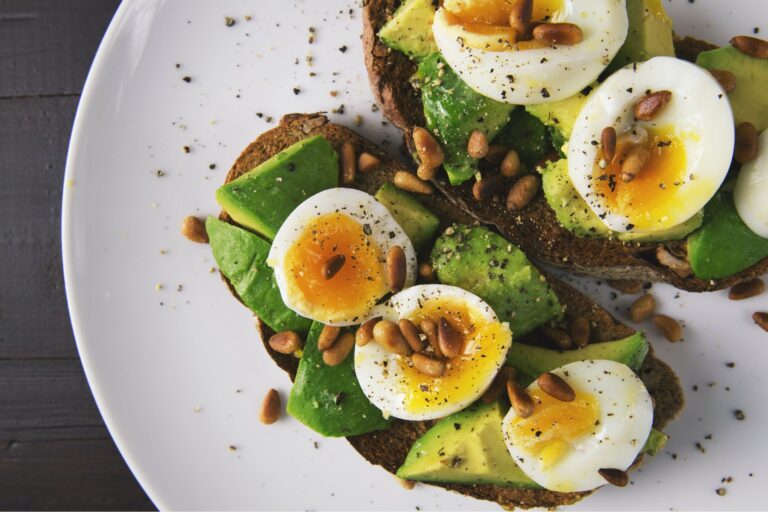BLOG:
The Body Composition Diet: How Macronutrients and Micronurtients Affect Your Body

When working towards achieving your body composition goals, such as fat loss while maintaining or gaining muscle, mastering the balance between macronutrients and micronutrients can help you level up your game.
Tailoring your intake of essential macronutrients (proteins, fats and carbohydrates), and micronutrients (vitamins and minerals) can help you turn food into your superpower. The benefits are immeasurable, from providing essential daily energy to hormonal regulation, immunity boosting, preventing illness and more.
So what exactly are macronutrients and micronutrients, and what do they do for your body?
Macronutrients
Macronutrients are the essential nutrients your body needs in relatively large amounts in order to function properly. They contribute to your daily caloric intake, and provide the energy required for various physiological functions.
Macronutrients play an important role in helping you achieve your body composition goals, as they fuel your workouts, are crucial for muscle building and repair, contribute to energy storage and hormonal regulation, preserve lean muscle mass, and optimize metabolic processes.
There are three main types of macronutrients:
Proteins - your repair crew
Proteins are the superheroes of the macronutrient world. They are vital for achieving body composition goals as they support muscle building and repair, and are crucial for increasing or maintaining lean muscle mass.
With a higher thermic effect of food, proteins help elevate your metabolic rate, aiding in weight management. Protein-rich foods also promote satiety and have a positive effect on appetite control.
Essential for preserving lean muscle, proteins influence nutrient partitioning, favoring muscle building over fat storage. Post-exercise, protein consumption accelerates recovery, reducing muscle soreness and supporting consistent training. Proteins also play a role in hormonal regulation, immune function and blood sugar stabilization.
To work out how much protein you need, multiply your body weight by 1.2-2.2. For example, if you weigh 80kg, you would require a protein intake of up to 176g per day. Making sure you’re getting enough high-quality protein sources such as lean meats, dairy, and plant-based proteins is essential when working towards body composition goals.
Fats - your energy reserves
Contrary to popular belief, fats are not the enemy. Healthy fats actually play a vital role when it comes to achieving your body composition goals as they serve as a concentrated and efficient energy source. They also contribute to hormonal balance, which is crucial for metabolism and muscle growth, and aid in the absorption of fat-soluble vitamins essential for overall health.
Fats also play a vital role in cell structure, support appetite regulation by promoting satiety, and offer insulation and protection for organs. Additionally, fats help maintain lean muscle mass by providing energy that spares protein breakdown, and they contribute to long-term sustained energy during low-intensity activities.
When determining your daily fat intake, aim for 1 gram per kilogram of ideal body weight. For example, if your goal body weight is 60kg, work towards roughly 60g of fat per day.
Healthy fats include: Monounsaturated fats, found in olive oil, avocados, and certain nuts, are associated with heart health. Polyunsaturated fats, encompassing Omega-3 and Omega-6 fatty acids include fatty fish such as salmon and trout and flaxseeds. Omega-3 fatty acids, known for their anti-inflammatory properties, are abundant in fatty fish, flaxseeds, chia seeds, and walnuts. Nuts and seeds offer a mix of healthy fats and essential nutrients.
Unhealthy fats to limit or avoid in your diet include trans fats, commonly found in processed and fried foods; saturated fats, prevalent in fatty meats and full-fat dairy; and certain cooking oils high in saturated fats, such as palm oil and coconut oil. It’s important to be cautious with commercially baked goods, processed snacks, and some margarines, as they may contain these unhealthy fats.
Striking a balance with healthy fats is essential for optimizing energy, nutrient absorption, prevention of cardiovascular issues, and overall well-being in the pursuit of body composition goals.
Carbs - your energy warriors
Carbohydrates are vital for achieving your body composition goals as they serve as your body’s primary energy source. Adequate carbohydrate intake helps preserve lean muscle mass by preventing the breakdown of muscle proteins for energy and promoting glycogen storage, ensuring sustained energy levels.
Carbohydrates also contribute to metabolic efficiency, stabilize blood sugar levels, and play a role in hormonal regulation, particularly insulin, which supports muscle growth. They also aid in post-exercise recovery by replenishing glycogen stores and facilitating muscle repair.
Focus on choosing nutrient-dense complex carbohydrates over refined carbohydrates. Opt for nutrient-dense options like whole grains (quinoa, brown rice, oats), fruits (berries, apples, oranges), and vegetables (spinach, kale, carrots) to ensure a sustained release of energy and support overall health. If you can, avoid refined carbohydrates found in white bread, sugary snacks (cookies, candy), processed beverages (soda, sweetened juices), and instant packaged foods, as they can contribute to unstable blood sugar levels and lack essential nutrients.
Micronutrients
Micronutrients are essential nutrients that the human body needs in smaller quantities compared to macronutrients, but are just as critical for various physiological functions.
Micronutrients play a crucial role in achieving body composition goals for several reasons. They support metabolic processes, energy production, and hormonal regulation, aiding in muscle building and fat loss. They also contribute to overall health, immune function, and the prevention of nutrient deficiencies, ensuring the body functions optimally.
The two key categories of micronutrients include:
Vitamins - your tiny nutrient powerhouses
Vitamins are essential for achieving body composition goals as they play diverse roles in metabolism, energy production, cellular function, immune support and muscle health.
B vitamins contribute to energy metabolism, supporting physical activity, while antioxidants like vitamins A, C, and E protect cells from damage during exercise. Vitamin D is crucial for bone health, supporting the demands of physical activity, and various vitamins aid in hormonal regulation, immune system support, and reducing inflammation.
Vitamins also contribute to optimal nutrient absorption, stress management, and support for blood flow and oxygen transport, which collectively contribute to overall health and well-being.
Foods that are high in vitamins include fruits (such as citrus fruits, berries, and kiwi), vegetables (especially leafy greens, carrots, and bell peppers), nuts and seeds, dairy products, fish, lean meats, and whole grains, providing essential vitamins like vitamin C, vitamin A, vitamin K, various B vitamins, vitamin D, and vitamin E.A balanced intake of fruits, vegetables, and fortified foods ensures that your body gets the vitamins it needs for optimal functioning.
Minerals - the silent regulators
Minerals such as calcium, iron, and zinc are critical for maintaining a range of bodily functions including bone health, oxygen transport, and immune system support.
Key minerals like calcium and magnesium enhance bone health, crucial for weight-bearing exercises, while others like potassium aid optimal muscle function. Electrolytes maintain fluid balance, supporting hydration and nerve function during exercise. Trace minerals, including zinc and selenium, influence metabolism and hormonal regulation, impacting muscle growth and overall composition. Iron ensures adequate oxygen transport for sustained energy, and anti-inflammatory effects of minerals like magnesium aid recovery. Additionally, minerals support immune resilience, influenced by zinc and copper, and contribute to insulin sensitivity, impacting weight management.
Various foods high in minerals include dairy products, leafy greens, nuts, seeds, meats, and whole grains, providing essential nutrients like calcium, iron, potassium, magnesium, zinc, sodium, phosphorus, and selenium. Incorporating a variety of nutrient-rich foods ensures a diverse mineral intake.
A well-balanced diet rich in minerals is crucial for multifaceted physiological support toward achieving and maintaining body composition goals.
In Summary
The best diet for improving your body composition is a holistic approach to nutrition that goes beyond the scale. By understanding how macronutrients and micronutrients influence our bodies, we can make informed choices that support not only weight management but also overall health and well-being. Remember, it’s not just about how much you eat but how you nourish your body with the essential elements it needs to thrive.
Please keep in mind that the advice in this article is of a general nature and should not be relied on as professional advice. You should always consult your physician before beginning any diet, nutrition, or fitness plan.





